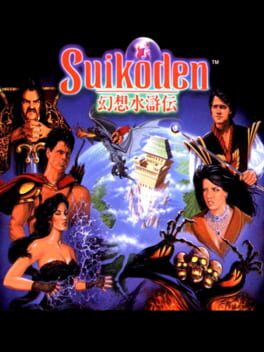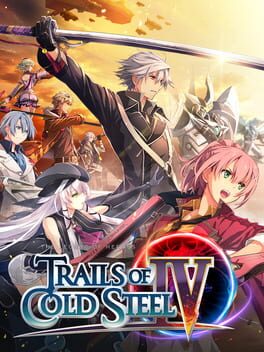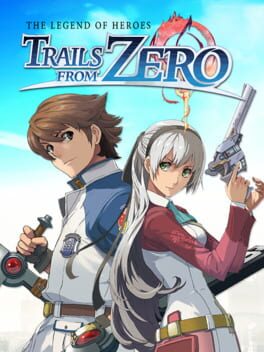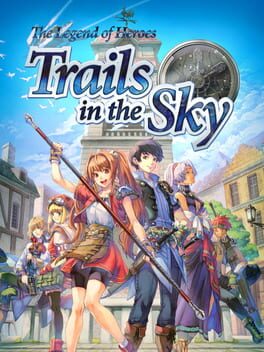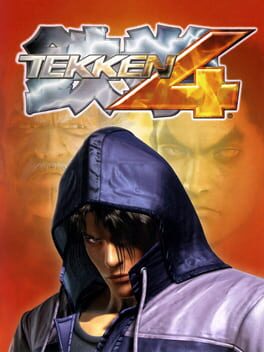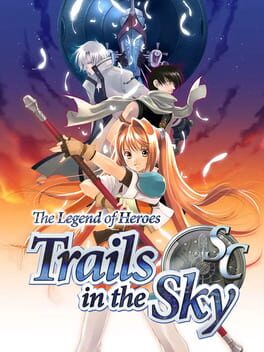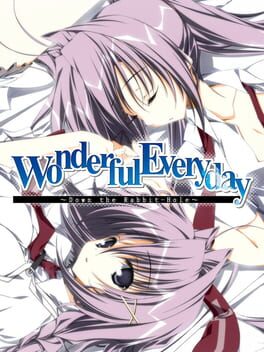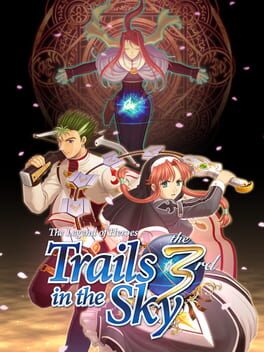Hannibalmick
459 Reviews liked by Hannibalmick
Suikoden
1995
Silent Hill 2
2001
You can slander Shadow of the colossus all you like for its endless pathfinding, clunky controls, awkward camera, but the fact is:
Shadow of the Colossus is still a one of a kind experience. And you know it.
A truly special video game that feels so different from anything else I have played before it. Or since for that matter. That sombre, almost tragic atmosphere is just something else.
No game feels quite like Shadow of the Colossus.
A remarkable achievement in daring vision and creativity.
Shadow of the Colossus is still a one of a kind experience. And you know it.
A truly special video game that feels so different from anything else I have played before it. Or since for that matter. That sombre, almost tragic atmosphere is just something else.
No game feels quite like Shadow of the Colossus.
A remarkable achievement in daring vision and creativity.
Xenogears
1998
Tetsuya Takahashi: "i skimmed the abstract of like 5 different philosophy books and arthur c clarke novels and i'm here to just vomit all that back at you for 70 hours without saying anything meaningful about any of it"
Me: "sounds bad"
Tetsuya Takahashi: "i've also included kung-fu and robots"
Me: "sounds sick"
Yoko Taro: (furiously taking notes)
Me: "sounds bad"
Tetsuya Takahashi: "i've also included kung-fu and robots"
Me: "sounds sick"
Yoko Taro: (furiously taking notes)
Dark Souls III
2016
Cancel me if you so desire, FromSoft fans, but I have to speak the truth: this is the best Dark Souls game by a significant margin. In terms of world design, bosses, and especially gamefeel, this game is a cut above both 1 and 2. Though it's often described as the true sequel to Dark Souls, 3 departs from (and adds to) the lore and themes of the original to a far greater extent than 2, and many of its characters and levels feel like responses to the first game (most obviously Aldrich's Anor Londo), rather than simply remixing and rehashing the same themes. The two DLCs add more phenomenal bosses to the game, and the "final boss" of the Ringed City is perhaps my favorite in any game, and the perfect conclusion to the franchise. DS3 was unfairly dismissed at its initial release by some hardcore Souls fans. If you're one of them, please give this game another chance. Second only to Bloodborne in the FromSoft pantheon.
This review contains spoilers
This is going to be a bit of a rant, maybe more than FC deserves. It's difficult for me to do otherwise though, considering the cultural recognition Trails in the Sky now has in its diehard Falcom community. Really it's just unavoidable now, as any conversation I could have about Trails in the Sky will inadvertently be tied back to the reverent fanbase. I don't think that's what the general public who play this game will experience, but when you're about as online as I am, it won't come as a surprise that a lot of what I COULD'VE talked about when it came to this game was quickly dismissed.
I don't hold that against the people who love this series, but it was very interesting to me when I came out the end of this game quite positive after the first runthrough. Specifically that any and all talk I could make about the specifics of this game were weirdly shouted down as "this game is just setup for the entire series and it should not be judged without that retrospection in mind." So you know what, I kept my mouth shut. It's not a terrible enough point to consider, even though I thought then as I do now that it's certainly a weak excuse. So I kept going, I went ahead and immersed myself in a fat load of Trails discourse and ended up surrounded by it, being spoiled on several things before I even thought to finally pick up SC. I may not be an expert on Trails in the Sky at this point, but I do feel a lot more informed about the series and FC's place in it as a whole. And it is sorely not the conclusion I think those people really hoped I would come to.
FC is not just a setup of Trails in the Sky's series narrative that leads to interesting payoff, it is a setup of Trails in the Sky's criminal flaws and trends. It's literally a walking simulacra of what the series stands for in its biggest moments, from its biggest positives to its awful issues. I'll start on what I still reminisce fondly, which is FC's sense of character. After a pretty dogshit poorly paced intro, there's more moments than I can effectively count where the cast of FC ends up bouncing in my head with their sense of heart and strong humanization. Dialogue is very reflective and strongly well written for each of their characters, and it all contributes to comfy vibes that define the midgame, which I'd say is where FC certainly peaks. Worldbuilding is no slouch to get you into the setting either, with a pretty grounded dialogue and well setup stakes for adventure that feel refreshing. The story keeps that idea in mind, which makes the endgame feel rather deserved even when the stakes are still pretty fate of the nation-heavy.
The story, however, is also when the cracks really start to show. FC is really quick to show its hand that a lot of the characters it puts at you are effectively tools, motivations that are nice setting dressing but completely thrown out when it's suitable. To make it clearer what I'm talking about, FC establishes a villain who is fighting for a past idea of his nation in absence of someone he respected. They then literally, and I cannot stress this enough, throw this out that his motivations and his choices were brainwashed by some other guy we don't fucking know at all from the get go. Even if I were to pretend that didn't happen, FC really does not explore this theme much if at all, or this backstory to an even genuinely sympathetic level.
This is the clinching issue with Trails stories, the setup politics that points at interesting themes are wallpaper, torn asunder right in front of you at every turn you could get. The villain I quote here is really not the first time that the inner themes of a nation you visit are hamstrung for a big bad that is neither emblematic of the themes to be a good metaphor or interesting in their own right. There's even more stuff I can get ranting about, but talking about the ramifications of moral motivations and how quickly they are side-stepped was already a poor errand for me to rag on when this game pushes that incest is fine, actually.
The combat is about as disappointing, but has more to do with the base mechanics that Trails seems to care about rather than its potential. Early-midgame is a bit interesting initially, where the grid-like structure and the meter management of arts ends up forcing you to take encounters by the skin of the teeth while you're trying to figure out your strategy. Immediately after this, it falls apart as you begin to realize that Trails could not give less of a shit about the action economy it makes, never going beyond "lose a turn" or "gain a turn" in terms of time. Positioning, while sometimes tested with genuinely solid superbosses, also ends up turning into dominant strategies of doing the same thing ad nauseum. I highlight the endgame for this especially, where p much all enemy fights are weakly put a massive fucking AOE to encapsulate as much as you can, and then repeat. Were it not for the customization and good user experience for figuring out the combat systems on your own with solid feedback, I would say this combat is average.
And I'd like to say that my issues here are FC-only still, I really would. I really would like to believe the narrative that keeps getting wrapped in front of me that this is at worst just a middling setup that then gets into the real kino shit that is the series and fixes all of this crap. But no, it's not. Trails does get better at its strengths from here as it goes on. The character writing continues to be good, and gets great and even excellent often. The vibes do get stronger, especially in terms of the soundtrack that gets outright legendary. But the poor foundation in story, general thematic writing, and combat is what you see here on full display. It's so vastly the embodiment of Trails that it's stunning how much talk about the series now feels like gaslighting to me.
Trails in the Sky FC is not a good game, and though I still lean positively on it, I would not recommend it to most. Worth a try at least, if you can get past the awful pacing in the first arc or two and end up enjoying yourself a ton then you absolutely will love the rest of the series. Is it worth trudging through if you don't enjoy it superbly to get to the rest of the series? I'm still not really sure about that.
I don't hold that against the people who love this series, but it was very interesting to me when I came out the end of this game quite positive after the first runthrough. Specifically that any and all talk I could make about the specifics of this game were weirdly shouted down as "this game is just setup for the entire series and it should not be judged without that retrospection in mind." So you know what, I kept my mouth shut. It's not a terrible enough point to consider, even though I thought then as I do now that it's certainly a weak excuse. So I kept going, I went ahead and immersed myself in a fat load of Trails discourse and ended up surrounded by it, being spoiled on several things before I even thought to finally pick up SC. I may not be an expert on Trails in the Sky at this point, but I do feel a lot more informed about the series and FC's place in it as a whole. And it is sorely not the conclusion I think those people really hoped I would come to.
FC is not just a setup of Trails in the Sky's series narrative that leads to interesting payoff, it is a setup of Trails in the Sky's criminal flaws and trends. It's literally a walking simulacra of what the series stands for in its biggest moments, from its biggest positives to its awful issues. I'll start on what I still reminisce fondly, which is FC's sense of character. After a pretty dogshit poorly paced intro, there's more moments than I can effectively count where the cast of FC ends up bouncing in my head with their sense of heart and strong humanization. Dialogue is very reflective and strongly well written for each of their characters, and it all contributes to comfy vibes that define the midgame, which I'd say is where FC certainly peaks. Worldbuilding is no slouch to get you into the setting either, with a pretty grounded dialogue and well setup stakes for adventure that feel refreshing. The story keeps that idea in mind, which makes the endgame feel rather deserved even when the stakes are still pretty fate of the nation-heavy.
The story, however, is also when the cracks really start to show. FC is really quick to show its hand that a lot of the characters it puts at you are effectively tools, motivations that are nice setting dressing but completely thrown out when it's suitable. To make it clearer what I'm talking about, FC establishes a villain who is fighting for a past idea of his nation in absence of someone he respected. They then literally, and I cannot stress this enough, throw this out that his motivations and his choices were brainwashed by some other guy we don't fucking know at all from the get go. Even if I were to pretend that didn't happen, FC really does not explore this theme much if at all, or this backstory to an even genuinely sympathetic level.
This is the clinching issue with Trails stories, the setup politics that points at interesting themes are wallpaper, torn asunder right in front of you at every turn you could get. The villain I quote here is really not the first time that the inner themes of a nation you visit are hamstrung for a big bad that is neither emblematic of the themes to be a good metaphor or interesting in their own right. There's even more stuff I can get ranting about, but talking about the ramifications of moral motivations and how quickly they are side-stepped was already a poor errand for me to rag on when this game pushes that incest is fine, actually.
The combat is about as disappointing, but has more to do with the base mechanics that Trails seems to care about rather than its potential. Early-midgame is a bit interesting initially, where the grid-like structure and the meter management of arts ends up forcing you to take encounters by the skin of the teeth while you're trying to figure out your strategy. Immediately after this, it falls apart as you begin to realize that Trails could not give less of a shit about the action economy it makes, never going beyond "lose a turn" or "gain a turn" in terms of time. Positioning, while sometimes tested with genuinely solid superbosses, also ends up turning into dominant strategies of doing the same thing ad nauseum. I highlight the endgame for this especially, where p much all enemy fights are weakly put a massive fucking AOE to encapsulate as much as you can, and then repeat. Were it not for the customization and good user experience for figuring out the combat systems on your own with solid feedback, I would say this combat is average.
And I'd like to say that my issues here are FC-only still, I really would. I really would like to believe the narrative that keeps getting wrapped in front of me that this is at worst just a middling setup that then gets into the real kino shit that is the series and fixes all of this crap. But no, it's not. Trails does get better at its strengths from here as it goes on. The character writing continues to be good, and gets great and even excellent often. The vibes do get stronger, especially in terms of the soundtrack that gets outright legendary. But the poor foundation in story, general thematic writing, and combat is what you see here on full display. It's so vastly the embodiment of Trails that it's stunning how much talk about the series now feels like gaslighting to me.
Trails in the Sky FC is not a good game, and though I still lean positively on it, I would not recommend it to most. Worth a try at least, if you can get past the awful pacing in the first arc or two and end up enjoying yourself a ton then you absolutely will love the rest of the series. Is it worth trudging through if you don't enjoy it superbly to get to the rest of the series? I'm still not really sure about that.
i couldnt dislike it as much as i told myself i would, mostly because it is really fun to experience as something i thought i couldnt stand anymore: a story of constant reveals with the eventual goal of having everything explainable in the end. i was not ready for the sheer /volume/ of this 13 sentinels was bringing to the table, in its way more impressive than other plot twisty adventure games it gets compared to, like uchikoshi-written games or danganronpa. it is better at being this kind of thing than those mostly for the unique thrill of being so overwhelmed from many angles, and the way this overwhelmingness works in tandem with being a story about memory and perception is more potentially interesting to me.
but i also could not love 13 sentinels as much as i would like to because, just as i was afraid of, it chose a path of plot dumping at the cost of its character writing. many characters' motivations feel unexpounded on past their tropey origin point, and maybe you can argue theres some sincerity to exploring these tropes but i am not sold by that alone. you are bombarded with information and that means the game doesnt try hard enough to give many of its characters time to breathe beyond moving plot forward. this results in their scenarios often lacking impact as you reach their conclusions, giving me no reason to come around to characters i didnt care for (yakushiji) and sucking the wind out of some of the ones i did (shinonome). and one late game character is barely a character as much as an excuse to tie up loose ends, and the game mechanically admits as much.
this game is genuinely fun when i was there, playing it, and even the combat wasnt a hindrance to that. i dont regret playing it by any means. but looking back i feel like its just an especially good version of strictly concrete [100 intriguey setups = 100 explanation pay offs] type narratives that are always valued as "Best Story" in games, and thats all there was. maybe im not giving credit to its themes expressed thru its kaleidoscope of sci fi ideas but still, would like to have felt something outside of its intellectual exercise.
but i also could not love 13 sentinels as much as i would like to because, just as i was afraid of, it chose a path of plot dumping at the cost of its character writing. many characters' motivations feel unexpounded on past their tropey origin point, and maybe you can argue theres some sincerity to exploring these tropes but i am not sold by that alone. you are bombarded with information and that means the game doesnt try hard enough to give many of its characters time to breathe beyond moving plot forward. this results in their scenarios often lacking impact as you reach their conclusions, giving me no reason to come around to characters i didnt care for (yakushiji) and sucking the wind out of some of the ones i did (shinonome). and one late game character is barely a character as much as an excuse to tie up loose ends, and the game mechanically admits as much.
this game is genuinely fun when i was there, playing it, and even the combat wasnt a hindrance to that. i dont regret playing it by any means. but looking back i feel like its just an especially good version of strictly concrete [100 intriguey setups = 100 explanation pay offs] type narratives that are always valued as "Best Story" in games, and thats all there was. maybe im not giving credit to its themes expressed thru its kaleidoscope of sci fi ideas but still, would like to have felt something outside of its intellectual exercise.
Tekken 4
2001
Competitive game aside, this is one of the best representations of martial arts in videogames.
Context and fidelity packaged in the own diegesis.
Diving into it through the ps2 bios
Asphalt and Mist.
Parkings and malls.
Beach, jails , skycrapers.
The new world of technology and globalization.
The setting is the frame of the beginning of the century in Fighting, in which traditional martial arts spread throughout the world and are reconfigured in sports and exercise. contexts coexist with new fighting systems designed for combat itself.
Jin Kazama abandoning his homeland, family and his karate style based on tradition and roots for the Kyokushinkai Karate, more pragmatic and brutal . Learning it in Brisbane (which is famous for the practice of Kyokushinkai), out of its cradle, suggests the expansion of martial arts to various levels that the arrival of a new millennium implies.
in tradition, continuing with the respectful, almost mystical reverential treatment that they once had, or in modernity, redesigned and remixed for the purpose of competition or lethal assault.
No matter the approach, there is room for everything,
In a world where fighting games are remembered for their impact on the medium or for their mechanical quality, Tekken 4 has value as a small Digital portrait of how martial arts have spread and understood throughout the world with the arrival of the new millennium. . Something that can be appreciated through a careful and (mostly) faithful mocap and the reduction of fantastical elements.
Also, fuck the E.V.O .
Context and fidelity packaged in the own diegesis.
Diving into it through the ps2 bios
Asphalt and Mist.
Parkings and malls.
Beach, jails , skycrapers.
The new world of technology and globalization.
The setting is the frame of the beginning of the century in Fighting, in which traditional martial arts spread throughout the world and are reconfigured in sports and exercise. contexts coexist with new fighting systems designed for combat itself.
Jin Kazama abandoning his homeland, family and his karate style based on tradition and roots for the Kyokushinkai Karate, more pragmatic and brutal . Learning it in Brisbane (which is famous for the practice of Kyokushinkai), out of its cradle, suggests the expansion of martial arts to various levels that the arrival of a new millennium implies.
in tradition, continuing with the respectful, almost mystical reverential treatment that they once had, or in modernity, redesigned and remixed for the purpose of competition or lethal assault.
No matter the approach, there is room for everything,
In a world where fighting games are remembered for their impact on the medium or for their mechanical quality, Tekken 4 has value as a small Digital portrait of how martial arts have spread and understood throughout the world with the arrival of the new millennium. . Something that can be appreciated through a careful and (mostly) faithful mocap and the reduction of fantastical elements.
Also, fuck the E.V.O .
The Legend of Heroes: Trails in the Sky SC continues the operation with a few minor tweaks to combat and systems, as the plot veers towards more and more derivative territory. Certain heartfelt character moments (Agate and Tita in particular) stand out, but there's not a whole lot else to engage the player if they aren't already invested in the story. The few improvements over its predecessor (actual difficulty and dungeons this time) were marred by yet another weak final chapter.
It's not hard to see why people often call this a love-it-or-hate-it game, but I personally fall more in the love-it-and-hate-it camp.
God, where to even start. This is by far the most conflicted I have ever felt about any piece of fiction. Subarashiki Hibi, or SubaHibi for short, is an undeniably weird, beautiful, insane, unique, ambitious, fucked up, and, for some people at least, powerful narrative experience, albeit one that is bloated with overindulgent shock value, severe pacing issues, redundant dialogue, pointless fanservice, vastly inconsistent writing quality, moments of embarrassingly bad taste and just an overall tactless and heavy-handed treatment of sensitive issues like bullying, sexual violence and suicide.
And yet, in spite of SubaHibi’s large number of drawn-out, mind-numbing, nauseating low points, there is still a certain layer to SubaHibi that resonated strongly enough with me to push me through this near 60-hour mammoth. But before I can get to the positives, I first need to elaborate on my criticisms with it, because that's the first thing anyone needs to hear before deciding whether to plunge down this particular rabbit hole or not.
Firstly, I don't think my harsh criticisms of SubaHibi can be the swept under the rug on the grounds of this being just some sort of pulpy throwaway visual novel, as it very clearly begs to be taken seriously as an ambitious work of art, and hence I will judge it accordingly. Maybe some hardcore VN readers will praise SubaHibi for blending trashy eroge material with serious artistic ambitions, but to a first-time eroge reader like me with no particular interest in the medium, those two aspects of the game were in frequent conflict each other, leading to an oftentimes dissonant experience.
Look, I knew full well that this game was going to feature some depraved shit down the line, and I certainly don’t have anything against artistic works exploring difficult topics per se. But it is hard for me to buy into the excuse that the excessive amount of cruel/shocking/vulgar material here all exists in service of a greater artistic goal—and yes, there is a limit to how much of that content a story can sustain, even if the end goal is to make the positive moments seem more powerful in contrast. SubaHibi features multiple scenes of severe sexual abuse and excessive bullying that are depicted in excruciating length and detail, oftentimes with very flimsy to non-existent narrative justification, being neither crucial to the plot nor offering any new insights into the game's themes or characters. The game doesn't even try to hide that many of these scenes only exist for the sole purpose of generating cheap thrills—be it to shock unsuspecting readers or to pander to people who bought it primarily on the promise of an eroge with fucked up sexual content. Why else would there be a scene recollection feature where you can only revisit the hentai scenes, and why the hell does that include the fucked up rape scenes?
To illustrate my point further, let me compare SCA-Ji's SubaHibi to an acclaimed Japanese pop cultural icon of similar emotional weight and thematic ambition, Hideaki Anno's anime series Neon Genesis Evangelion (which evidently played a huge role in influencing SubaHibi, although never explicitly referenced). Beneath surface appearances, and to oversimplify a bit, both of these works share a similar premise, using grand, insane, convoluted narratives with downright apocalyptic stakes (real or imagined) to tell deeply personal and introspective stories about the difficulty of connecting with others and the pain of living in an existentially uncertain universe. However, both are also about finding the courage to persevere despite how hard everything can get, emphasizing the importance of reaching out to others and revealing a firm belief in the possibility of a better future. The difference between these works, for me at least, is one of authenticity. While Evangelion succeeds very powerfully in making me feel like the immense pain it depicts is coming from a real place, one shared by the author and specifically woven into his work as both a form of self-reflection and a sincere desire to reach out to others, SubaHibi very often feels like it is fetishizing trauma more than anything, using it as a narrative tool to either shock you into submission or make you horny depending on how fucked up your tastes are.
To mention a few more specific things, here are three content warnings you should be aware of. Firstly, this game features a nauseatingly homophobic depiction of a gay side character, invoking the absolute worst stereotypes of gay men as sexual predators that come to mind (whereas, incidentally, the lesbian hentai scenes are portrayed in an excessively romantic fashion, clearly because male audiences can jack off to this). Secondly, SubaHibi is creepily obsessed with the idea of fucking your sister. Or rather sisters. Both the younger and the older. Imouto and onee-san. (While a certain relationship is technically not of biological nature, it is unambiguously implied to be sisterly in spirit). Which leads to my third point, the game features a downright pedophilic incest scene somewhat late in the game, completely ruining a central relationship and probably making you want to throw up inside. Your only options are to skip through the scene in question as fast as possible or simply quit the game entirely, but I suspect by that point most readers will choose the former option after having already invested so many hours into the story and wanting to know how everything plays out.
Anyway, at this point I'm kinda tired of letting this game frustrate me any further, so let's move on to some positives points. That said, I would be surprised if what I have written so far has not already convinced you that there is no way in hell you will ever spend any time or money on this game, which, to be honest, is probably for the better. Nonetheless, as someone who has already followed the rabbit hole to the end to see where it leads, I feel obliged to report both the good and the bad.
I will start with two points that don't require elaboration but should be mentioned regardless: firstly, the soundtrack is quite fantastic. The more sentimental pieces and piano ballads in particular are absolutely spectacular and sublimely evocative, but many of the more casual or unsettling background tracks are also very strong. Another plus is the art: character sprites and backgrounds are of generally high quality, with some of CGs being quite stunning in fact. The flagship CG with (part-time) protagonist Yuki framed against the towering sky is an all-time favourite.
The narrative structure of this game is as brilliant and ambitious as it is ridiculous and convoluted—in a good way—featuring a captivating sense of mystery, masterful foreshadowing and a perspective-shifting style of storytelling that takes Rashomon to its logical extreme. Unfortunately, the characterization and character development ranges from fascinating to idiotic: the heavyweights in the cast are mostly great, but many supporting characters can generally be filed under one-dimensional, empty-headed, wholly dehumanized stereotypes.
Either way, one of the best aspects about this cursed visual novel is the way it draws so much inspiration from a myriad of external sources, both Western and Japanese, including poetry, literature, philosophy and otaku culture. Importantly, this game's heavy reliance on intertextuality does not rely on mere empty name-dropping (although it certainly does some of that too), as SCA-Ji manages to seamlessly incorporate a whole wealth of material into SubaHibi's narrative and themes, on both micro and macroscopic scales, in a way that is synergetic and genuinely impressive. This may sound contradictory to my earlier, unfavourable comparison to Evangelion, but here I'm talking about the experience at large, not just the depraved shit. Obviously the whole rape torturefest aspect of SubaHibi only occupies a minority of the overall reading time, otherwise I would have never gotten through it. For example, one of the most fundamental influences, and cited many times throughout the novel, is something entirely unexpected: Wittgenstein’s Tractatus-Logico Philosophicus. In fact, the Tractatus forms the entire basis of SubaHibi’s core philosophy, which I must say I found quite powerful and resonant, though more for its poetic rather than intellectual merit. A quote from A. C. Grayling's Very Brief Introduction to Wittgenstein I think hits the nail on the head and equally applies to SubaHibi's philosophical ambitions as well:
"The vividness of Wittgenstein's metaphors, the unexpected examples and turns of thought, generate the sense that something profound is being expressed in his writings. Wittgenstein is in some ways a poet. Once one has sifted his texts and has ceased to be dazzled by the brilliance of metaphor and the poetical quality, once finds much less argument, and very much less definiteness in the crucial conceptions, than is expected in and demanded from philosophical inquiry. This is disappointing. But perhaps the value of Wittgenstein's work lies as much in its poetry, and therefore in its suggestiveness, as in its substance."
Dedicated fans of SubaHibi sometimes characterize it as a 2deep4u philosophical treatise, but for me at the heart of it all lies a simple but life-affirming message about the ability of two isolated souls to reach out to one another in a meaningful way, which is rendered particularly powerful because of this game's hyper-obsession with themes of death, solipsism and the limits of one's own cognitive world. On a meta level this conviction regarding the possibility of meaningful interpersonal bridges is also extended to the author and the reader (as well as art and audience in general), but I think I'll let you explore the rest for yourself. Let me just say that I do think the manner in which it approaches this topic does have a kernel of profundity, though more on an intangible level that is hard to articulate (which I could say ties into the game's exploration of the limits of language, but may as well just be attributed to my insufficient writing skills).
Anyway, in conclusion: while this game will often make the reader feel miserable and disgusted and has absolutely no shame in putting its characters through tremendous, largely pointless cruelty, I wouldn't go so far as to say it has no love for its characters or the player. SubaHibi simply takes the idea of emotional range to its extreme, for better or worse. (Truthfully, oftentimes for worse.) It goes through extraordinary lengths to end on a resolutely positive and uplifting final note, but unless you have an alarmingly high tolerance for excessive depravity and cruelty, you are unlikely to emerge from this experience without feeling seriously conflicted about it. Ultimately, I think the most revealing praise I can give is that, despite its enormous length and plethora of shortcomings and low points, SubaHibi was still worth it in the end. I will miss it and I will cherish it, as much as I will curse it.
God, where to even start. This is by far the most conflicted I have ever felt about any piece of fiction. Subarashiki Hibi, or SubaHibi for short, is an undeniably weird, beautiful, insane, unique, ambitious, fucked up, and, for some people at least, powerful narrative experience, albeit one that is bloated with overindulgent shock value, severe pacing issues, redundant dialogue, pointless fanservice, vastly inconsistent writing quality, moments of embarrassingly bad taste and just an overall tactless and heavy-handed treatment of sensitive issues like bullying, sexual violence and suicide.
And yet, in spite of SubaHibi’s large number of drawn-out, mind-numbing, nauseating low points, there is still a certain layer to SubaHibi that resonated strongly enough with me to push me through this near 60-hour mammoth. But before I can get to the positives, I first need to elaborate on my criticisms with it, because that's the first thing anyone needs to hear before deciding whether to plunge down this particular rabbit hole or not.
Firstly, I don't think my harsh criticisms of SubaHibi can be the swept under the rug on the grounds of this being just some sort of pulpy throwaway visual novel, as it very clearly begs to be taken seriously as an ambitious work of art, and hence I will judge it accordingly. Maybe some hardcore VN readers will praise SubaHibi for blending trashy eroge material with serious artistic ambitions, but to a first-time eroge reader like me with no particular interest in the medium, those two aspects of the game were in frequent conflict each other, leading to an oftentimes dissonant experience.
Look, I knew full well that this game was going to feature some depraved shit down the line, and I certainly don’t have anything against artistic works exploring difficult topics per se. But it is hard for me to buy into the excuse that the excessive amount of cruel/shocking/vulgar material here all exists in service of a greater artistic goal—and yes, there is a limit to how much of that content a story can sustain, even if the end goal is to make the positive moments seem more powerful in contrast. SubaHibi features multiple scenes of severe sexual abuse and excessive bullying that are depicted in excruciating length and detail, oftentimes with very flimsy to non-existent narrative justification, being neither crucial to the plot nor offering any new insights into the game's themes or characters. The game doesn't even try to hide that many of these scenes only exist for the sole purpose of generating cheap thrills—be it to shock unsuspecting readers or to pander to people who bought it primarily on the promise of an eroge with fucked up sexual content. Why else would there be a scene recollection feature where you can only revisit the hentai scenes, and why the hell does that include the fucked up rape scenes?
To illustrate my point further, let me compare SCA-Ji's SubaHibi to an acclaimed Japanese pop cultural icon of similar emotional weight and thematic ambition, Hideaki Anno's anime series Neon Genesis Evangelion (which evidently played a huge role in influencing SubaHibi, although never explicitly referenced). Beneath surface appearances, and to oversimplify a bit, both of these works share a similar premise, using grand, insane, convoluted narratives with downright apocalyptic stakes (real or imagined) to tell deeply personal and introspective stories about the difficulty of connecting with others and the pain of living in an existentially uncertain universe. However, both are also about finding the courage to persevere despite how hard everything can get, emphasizing the importance of reaching out to others and revealing a firm belief in the possibility of a better future. The difference between these works, for me at least, is one of authenticity. While Evangelion succeeds very powerfully in making me feel like the immense pain it depicts is coming from a real place, one shared by the author and specifically woven into his work as both a form of self-reflection and a sincere desire to reach out to others, SubaHibi very often feels like it is fetishizing trauma more than anything, using it as a narrative tool to either shock you into submission or make you horny depending on how fucked up your tastes are.
To mention a few more specific things, here are three content warnings you should be aware of. Firstly, this game features a nauseatingly homophobic depiction of a gay side character, invoking the absolute worst stereotypes of gay men as sexual predators that come to mind (whereas, incidentally, the lesbian hentai scenes are portrayed in an excessively romantic fashion, clearly because male audiences can jack off to this). Secondly, SubaHibi is creepily obsessed with the idea of fucking your sister. Or rather sisters. Both the younger and the older. Imouto and onee-san. (While a certain relationship is technically not of biological nature, it is unambiguously implied to be sisterly in spirit). Which leads to my third point, the game features a downright pedophilic incest scene somewhat late in the game, completely ruining a central relationship and probably making you want to throw up inside. Your only options are to skip through the scene in question as fast as possible or simply quit the game entirely, but I suspect by that point most readers will choose the former option after having already invested so many hours into the story and wanting to know how everything plays out.
Anyway, at this point I'm kinda tired of letting this game frustrate me any further, so let's move on to some positives points. That said, I would be surprised if what I have written so far has not already convinced you that there is no way in hell you will ever spend any time or money on this game, which, to be honest, is probably for the better. Nonetheless, as someone who has already followed the rabbit hole to the end to see where it leads, I feel obliged to report both the good and the bad.
I will start with two points that don't require elaboration but should be mentioned regardless: firstly, the soundtrack is quite fantastic. The more sentimental pieces and piano ballads in particular are absolutely spectacular and sublimely evocative, but many of the more casual or unsettling background tracks are also very strong. Another plus is the art: character sprites and backgrounds are of generally high quality, with some of CGs being quite stunning in fact. The flagship CG with (part-time) protagonist Yuki framed against the towering sky is an all-time favourite.
The narrative structure of this game is as brilliant and ambitious as it is ridiculous and convoluted—in a good way—featuring a captivating sense of mystery, masterful foreshadowing and a perspective-shifting style of storytelling that takes Rashomon to its logical extreme. Unfortunately, the characterization and character development ranges from fascinating to idiotic: the heavyweights in the cast are mostly great, but many supporting characters can generally be filed under one-dimensional, empty-headed, wholly dehumanized stereotypes.
Either way, one of the best aspects about this cursed visual novel is the way it draws so much inspiration from a myriad of external sources, both Western and Japanese, including poetry, literature, philosophy and otaku culture. Importantly, this game's heavy reliance on intertextuality does not rely on mere empty name-dropping (although it certainly does some of that too), as SCA-Ji manages to seamlessly incorporate a whole wealth of material into SubaHibi's narrative and themes, on both micro and macroscopic scales, in a way that is synergetic and genuinely impressive. This may sound contradictory to my earlier, unfavourable comparison to Evangelion, but here I'm talking about the experience at large, not just the depraved shit. Obviously the whole rape torturefest aspect of SubaHibi only occupies a minority of the overall reading time, otherwise I would have never gotten through it. For example, one of the most fundamental influences, and cited many times throughout the novel, is something entirely unexpected: Wittgenstein’s Tractatus-Logico Philosophicus. In fact, the Tractatus forms the entire basis of SubaHibi’s core philosophy, which I must say I found quite powerful and resonant, though more for its poetic rather than intellectual merit. A quote from A. C. Grayling's Very Brief Introduction to Wittgenstein I think hits the nail on the head and equally applies to SubaHibi's philosophical ambitions as well:
"The vividness of Wittgenstein's metaphors, the unexpected examples and turns of thought, generate the sense that something profound is being expressed in his writings. Wittgenstein is in some ways a poet. Once one has sifted his texts and has ceased to be dazzled by the brilliance of metaphor and the poetical quality, once finds much less argument, and very much less definiteness in the crucial conceptions, than is expected in and demanded from philosophical inquiry. This is disappointing. But perhaps the value of Wittgenstein's work lies as much in its poetry, and therefore in its suggestiveness, as in its substance."
Dedicated fans of SubaHibi sometimes characterize it as a 2deep4u philosophical treatise, but for me at the heart of it all lies a simple but life-affirming message about the ability of two isolated souls to reach out to one another in a meaningful way, which is rendered particularly powerful because of this game's hyper-obsession with themes of death, solipsism and the limits of one's own cognitive world. On a meta level this conviction regarding the possibility of meaningful interpersonal bridges is also extended to the author and the reader (as well as art and audience in general), but I think I'll let you explore the rest for yourself. Let me just say that I do think the manner in which it approaches this topic does have a kernel of profundity, though more on an intangible level that is hard to articulate (which I could say ties into the game's exploration of the limits of language, but may as well just be attributed to my insufficient writing skills).
Anyway, in conclusion: while this game will often make the reader feel miserable and disgusted and has absolutely no shame in putting its characters through tremendous, largely pointless cruelty, I wouldn't go so far as to say it has no love for its characters or the player. SubaHibi simply takes the idea of emotional range to its extreme, for better or worse. (Truthfully, oftentimes for worse.) It goes through extraordinary lengths to end on a resolutely positive and uplifting final note, but unless you have an alarmingly high tolerance for excessive depravity and cruelty, you are unlikely to emerge from this experience without feeling seriously conflicted about it. Ultimately, I think the most revealing praise I can give is that, despite its enormous length and plethora of shortcomings and low points, SubaHibi was still worth it in the end. I will miss it and I will cherish it, as much as I will curse it.
I've honestly lost count of how many hours I put into this. Putting aside the gargantuan and awe-inspiring open world and the epic story, the reason why this game became my favorite game of all time is because of Arthur Morgan, who is the greatest protagonist I've ever seen in a video game. I loved playing as him and his redemption is so powerful. I've rarely cried in a video game, but everytime I play this, I cry my eyes out. Rockstar made a masterpiece and for me it's going to be hard to top this one.
